Aromatherapy provides effective stress relief and enhances mental clarity through the use of essential oils. Key oils like lavender and chamomile promote relaxation and reduce anxiety, while peppermint boosts focus and cognitive performance. Incorporating these oils into daily routines can improve overall well-being and foster better stress management. Understanding the benefits and methods of application can help individuals personalize their aromatherapy experience for optimal results.
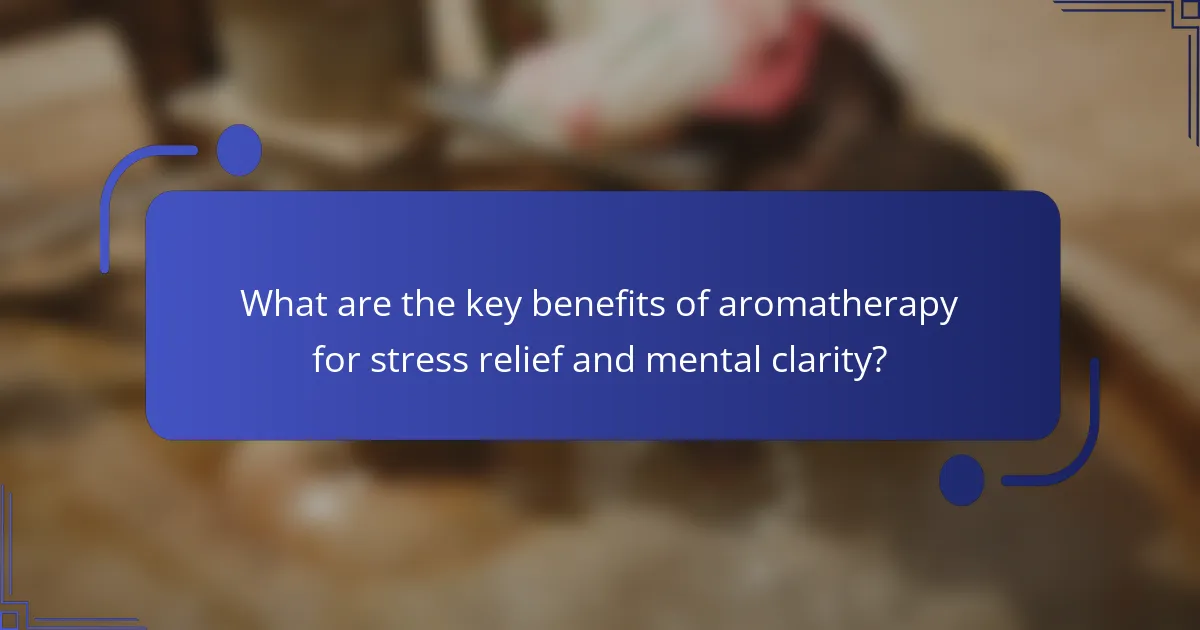
What are the key benefits of aromatherapy for stress relief and mental clarity?
Aromatherapy offers significant benefits for stress relief and mental clarity. It utilizes essential oils to enhance mood, reduce anxiety, and improve cognitive function.
Essential oils like lavender and chamomile are known for their calming properties. They can lower cortisol levels, promoting relaxation and reducing stress. Inhalation of these scents can trigger positive emotional responses, enhancing mental clarity.
Research indicates that aromatherapy can improve focus and concentration. For instance, peppermint oil has been shown to enhance alertness and cognitive performance, making it a valuable tool for mental clarity.
Incorporating aromatherapy into daily routines can lead to improved overall well-being. Regular use can foster a more relaxed state, allowing for better stress management and enhanced cognitive function.
How does aromatherapy reduce stress levels?
Aromatherapy effectively reduces stress levels by promoting relaxation and enhancing mood. Essential oils like lavender and chamomile have calming properties that lower cortisol, the stress hormone. Inhaling these scents can trigger emotional responses, leading to reduced anxiety and improved mental clarity. Research shows that aromatherapy can significantly decrease stress levels in various settings, including workplaces and healthcare environments.
Which essential oils are most effective for mental clarity?
Peppermint, rosemary, lemon, and eucalyptus oils are most effective for mental clarity. These essential oils enhance focus and cognitive function.
Peppermint oil contains menthol, which stimulates the mind and improves alertness. Rosemary oil is linked to improved memory retention and concentration. Lemon oil has uplifting properties that reduce mental fatigue. Eucalyptus oil promotes clear thinking by providing a refreshing aroma.
Using these oils in a diffuser or applying them topically can enhance mental clarity and reduce stress.
What role do scent and memory play in stress relief?
Scent and memory significantly enhance stress relief through aromatherapy. Certain scents evoke positive memories, promoting relaxation and mental clarity. For instance, lavender is linked to calming memories, reducing anxiety levels. Studies show that inhaling specific aromas can trigger the brain’s limbic system, which is responsible for emotions and memory. This connection helps individuals manage stress effectively by utilizing familiar scents that foster a sense of safety and well-being.
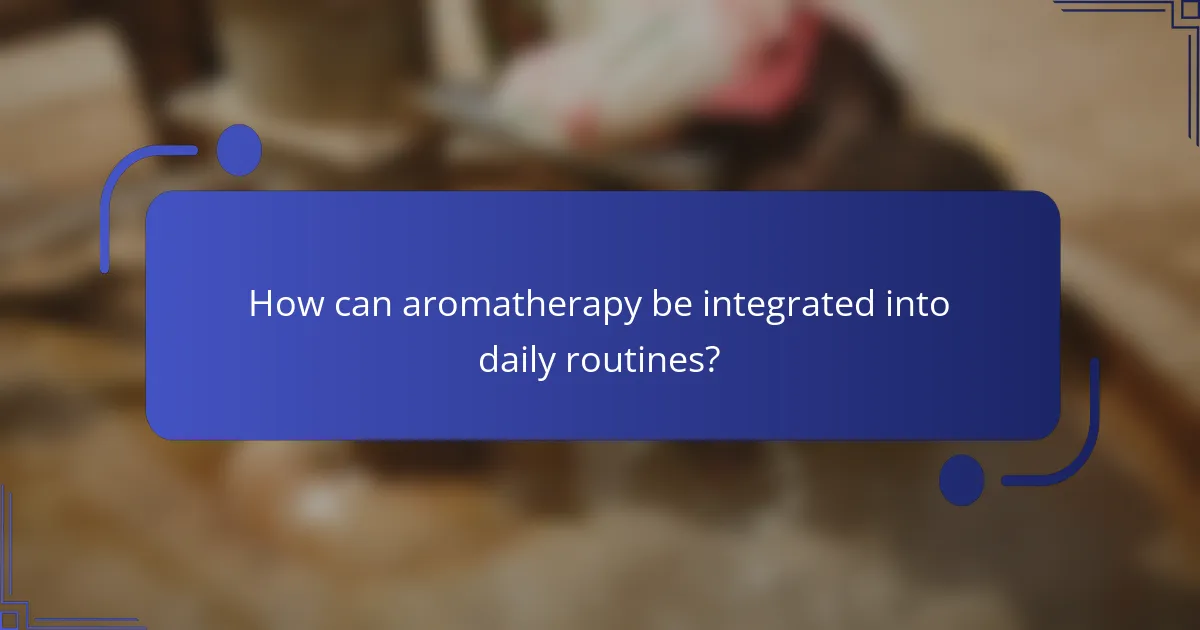
How can aromatherapy be integrated into daily routines?
Aromatherapy can be seamlessly integrated into daily routines to enhance stress relief and mental clarity. Start by diffusing essential oils like lavender or peppermint during morning rituals.
Incorporate aromatherapy into meditation or yoga practices for heightened focus. Use essential oil rollers for on-the-go stress relief, applying them to pulse points throughout the day.
Consider creating a calming bedtime routine with relaxing scents to improve sleep quality. Lastly, explore scented candles or room sprays in workspaces to boost productivity and create a serene environment.
What are the best methods for using essential oils at home?
The best methods for using essential oils at home include diffusion, topical application, and baths. Diffusion disperses oils into the air, promoting relaxation and clarity. Topical application allows for targeted relief and can enhance mood when combined with a carrier oil. Adding essential oils to baths provides a soothing experience that can alleviate stress. Each method maximizes the aromatherapy benefits for stress relief and mental clarity.
How can aromatherapy be used in the workplace for mental clarity?
Aromatherapy can enhance mental clarity in the workplace by using essential oils like peppermint and rosemary. These scents stimulate cognitive function and improve focus. Incorporating aromatherapy diffusers or personal inhalers can create a calming environment, reducing stress levels. Research indicates that certain aromas can boost productivity and creativity, making them valuable tools in office settings.
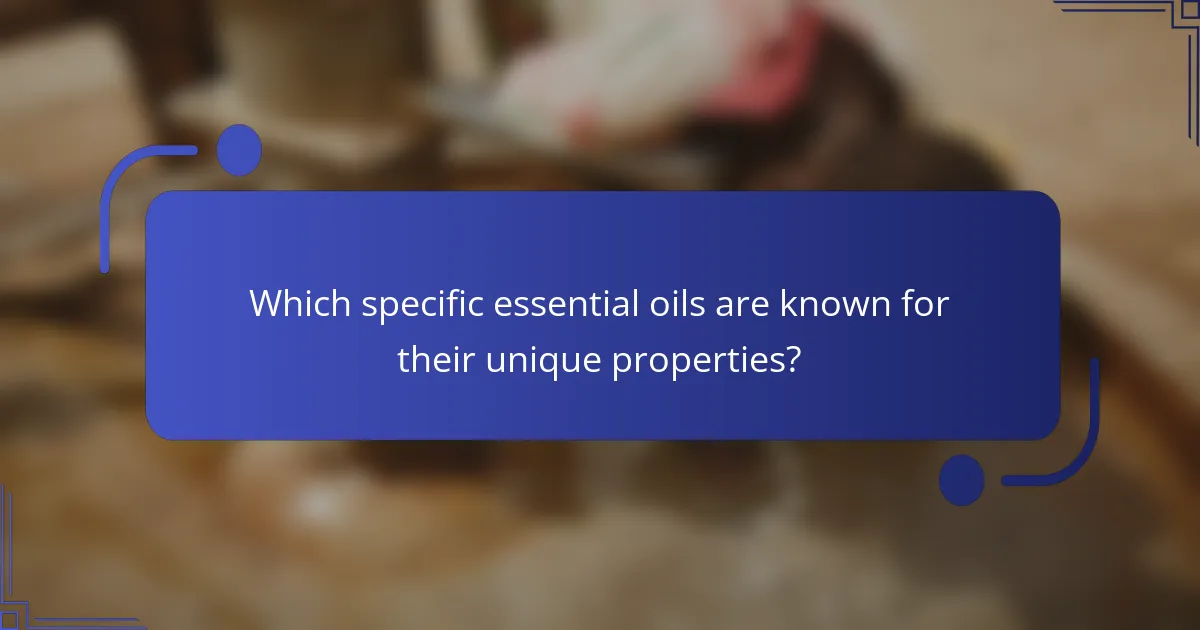
Which specific essential oils are known for their unique properties?
Specific essential oils known for their unique properties include lavender, known for its calming effects, and peppermint, recognized for enhancing mental clarity. Other notable oils are eucalyptus, which promotes respiratory health, and rosemary, linked to improved memory. Tea tree oil is valued for its antibacterial properties, while frankincense is celebrated for its grounding effects. Each oil offers distinct benefits that can enhance aromatherapy practices.
What makes lavender a popular choice for stress relief?
Lavender is a popular choice for stress relief due to its calming aroma and proven effects on anxiety reduction. Studies show that inhaling lavender essential oil can lower heart rate and blood pressure, promoting relaxation. The unique compound linalool in lavender contributes to its stress-relieving properties, making it effective in aromatherapy practices. Additionally, lavender can improve sleep quality, further enhancing mental clarity and emotional balance.
How does peppermint enhance cognitive function?
Peppermint enhances cognitive function by improving alertness and concentration. Its aroma stimulates the brain, leading to increased mental clarity and reduced fatigue. Studies indicate that inhaling peppermint essential oil can boost memory retention and cognitive performance. Additionally, it may help alleviate stress, which further supports cognitive efficiency.
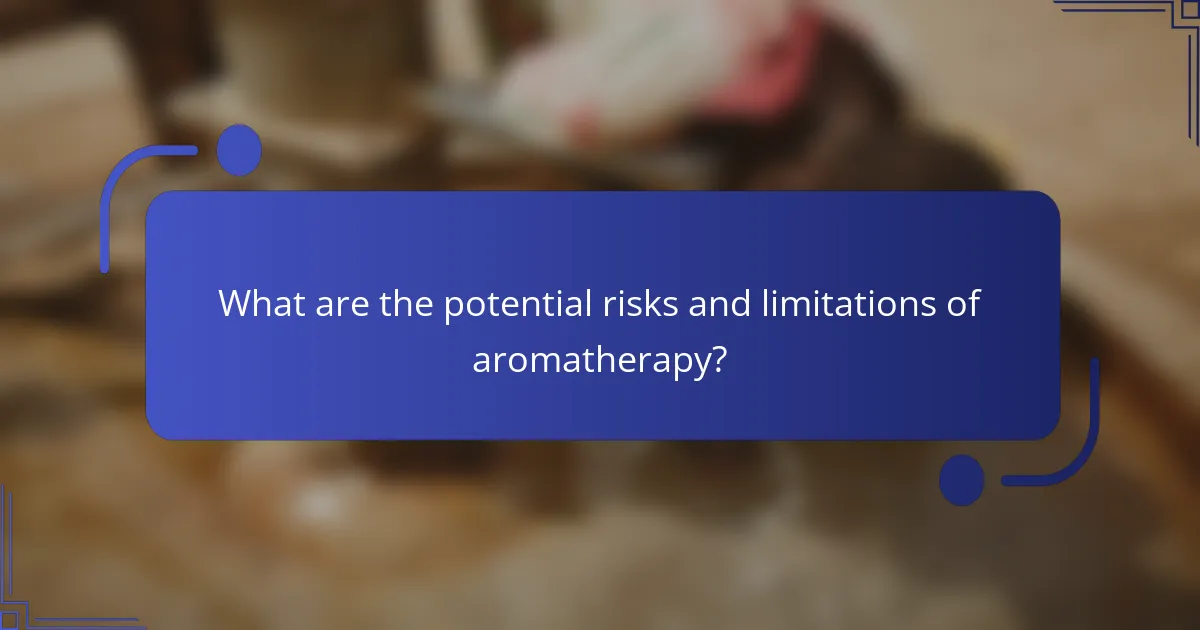
What are the potential risks and limitations of aromatherapy?
Aromatherapy can pose risks and limitations, including allergic reactions, skin irritations, and interactions with medications. Some essential oils may cause headaches or nausea in sensitive individuals. Quality control issues can lead to contamination or adulteration of oils, affecting safety and efficacy. Additionally, aromatherapy should not replace conventional medical treatments for serious conditions.
Are there any contraindications for using essential oils?
Yes, there are contraindications for using essential oils. Individuals with certain health conditions, pregnant women, and those taking specific medications should exercise caution. Essential oils can cause allergic reactions, skin irritation, or respiratory issues in sensitive individuals. Always consult a healthcare professional before use, especially if you have asthma, epilepsy, or are undergoing surgery.
What should users be aware of regarding quality and sourcing?
Users should prioritize quality and sourcing when selecting aromatherapy products for stress relief and mental clarity. Look for essential oils that are 100% pure and sourced from reputable suppliers. Check for third-party testing to ensure potency and safety. Organic certification can indicate higher quality, while sustainable sourcing practices support environmental health. Be cautious of blends that may contain synthetic additives, as they can diminish the therapeutic benefits.
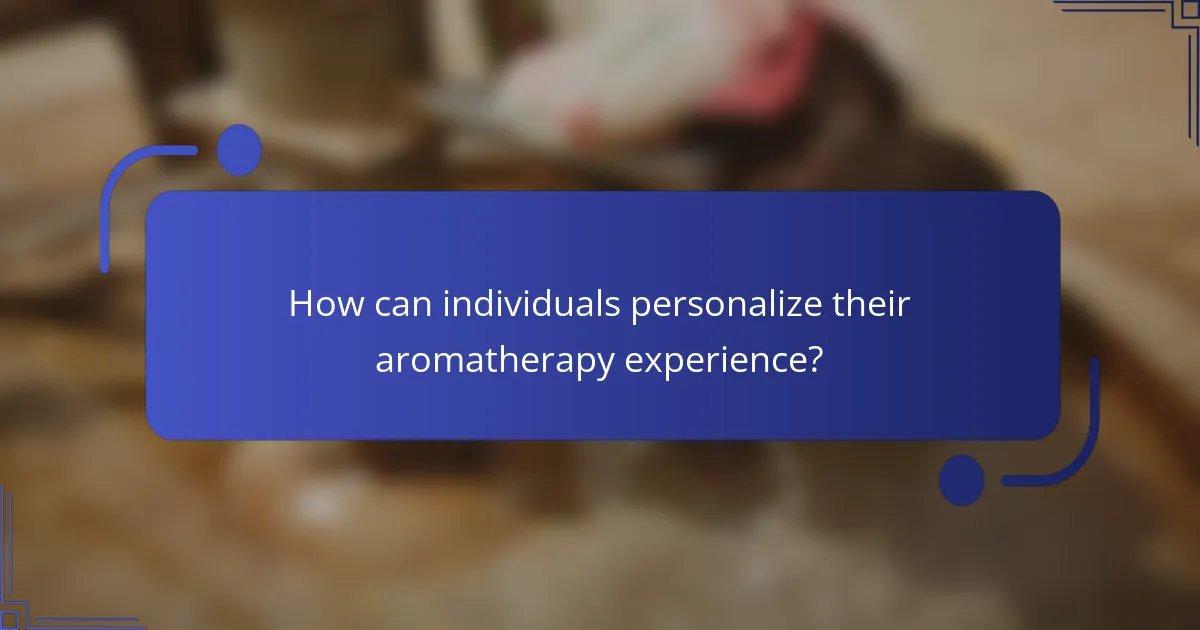
How can individuals personalize their aromatherapy experience?
Individuals can personalize their aromatherapy experience by selecting specific essential oils that match their needs. Choosing oils like lavender for relaxation or peppermint for mental clarity can enhance the benefits.
Experimenting with different methods of application, such as diffusers, inhalers, or topical blends, allows for tailored experiences. Adjusting the concentration and combinations of oils can further refine the effects.
Creating a calming environment, such as using soothing lighting or calming music, can elevate the aromatherapy experience. Regularly assessing personal responses to different scents can lead to more effective use over time.
What factors influence the effectiveness of aromatherapy for stress relief?
Aromatherapy effectiveness for stress relief is influenced by several factors. Key elements include the type of essential oils used, individual preferences, and the method of application.
The selection of essential oils plays a crucial role. For example, lavender and chamomile are known for their calming effects, while citrus oils can uplift mood. Individual preferences also matter; a scent that relaxes one person may not have the same effect on another.
The method of application significantly impacts results. Inhalation through diffusers or topical application with carrier oils can enhance the experience. Additionally, the environment where aromatherapy is practiced—such as a quiet, comfortable space—can further enhance its effectiveness.
Overall, understanding these factors can optimize the benefits of aromatherapy for stress relief and mental clarity.
How can one create a custom essential oil blend for mental clarity?
To create a custom essential oil blend for mental clarity, combine oils known for their cognitive benefits. Start with a base of rosemary, known for enhancing memory and focus. Add peppermint for its invigorating and uplifting properties. Incorporate lemon for its refreshing scent that promotes alertness. Mix these oils in a carrier oil, such as jojoba or almond oil, to dilute the blend for safe application. Aim for a ratio of three parts rosemary, two parts peppermint, and one part lemon. This blend can be used in a diffuser or applied topically for optimal mental clarity.
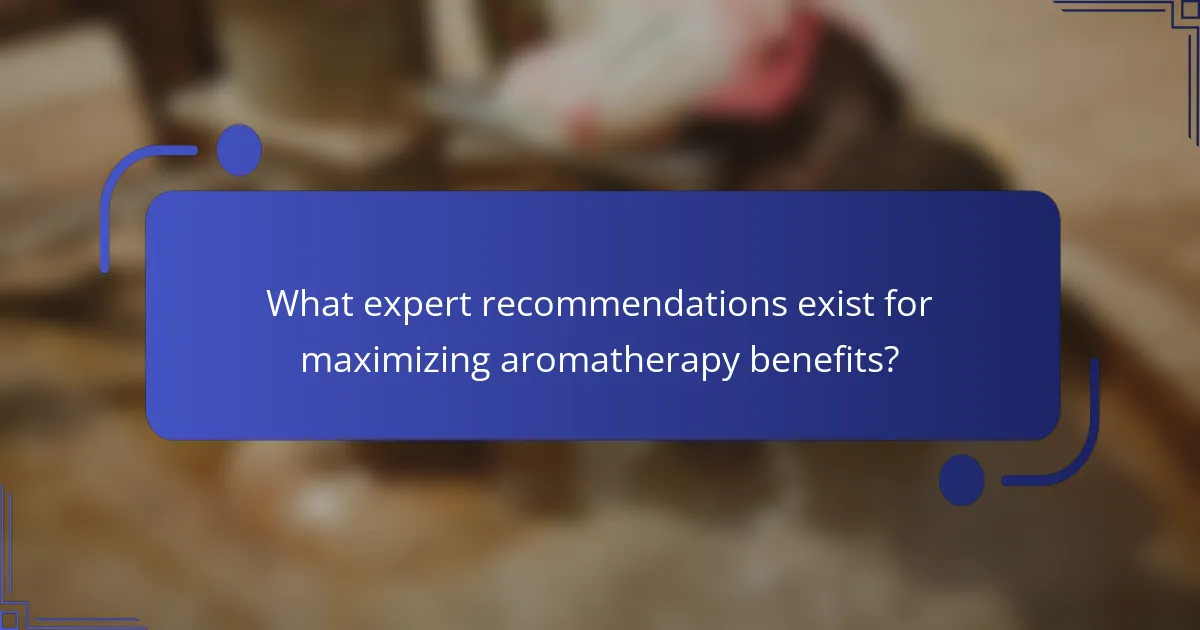
What expert recommendations exist for maximizing aromatherapy benefits?
To maximize aromatherapy benefits for stress relief and mental clarity, experts recommend specific practices. Use high-quality essential oils known for their calming properties, such as lavender and chamomile. Diffuse oils in well-ventilated spaces for consistent exposure. Incorporate deep breathing techniques while inhaling the aromas to enhance relaxation. Create a routine by setting aside dedicated time for aromatherapy sessions. Consider blending oils for unique effects, ensuring compatibility for safety and efficacy.
What are common mistakes to avoid when using essential oils?
Common mistakes to avoid when using essential oils include improper dilution, using low-quality oils, neglecting skin sensitivity tests, and applying oils without understanding their effects. These errors can diminish the benefits of aromatherapy for stress relief and mental clarity.
1. Improper dilution can lead to skin irritation.
2. Low-quality oils may lack therapeutic properties.
3. Neglecting sensitivity tests risks allergic reactions.
4. Applying oils without guidance can result in adverse effects.
5. Ignoring expiration dates reduces efficacy.
How can users track their progress and adjust their approach?
Users can track their progress and adjust their approach by keeping a journal of aromatherapy sessions. Regularly noting the essential oils used, duration, and perceived effects enhances self-awareness.
Incorporating feedback from personal experiences helps identify which scents promote relaxation or mental clarity. For example, lavender may improve sleep quality, while citrus oils could boost energy.
Using a rating system for each session can quantify benefits, allowing users to modify their methods effectively. This tailored approach ensures optimal stress relief and mental clarity through aromatherapy.
What are the best practices for storing and handling essential oils?
To store and handle essential oils effectively, keep them in dark glass bottles away from heat and light. Ensure proper sealing to prevent oxidation, and label each bottle with the oil’s name and date of opening.
1. Store in a cool, dark place to maintain potency.
2. Use dropper tops or pumps to minimize exposure to air.
3. Keep out of reach of children and pets for safety.
4. Avoid mixing oils unless knowledgeable about compatibility.
Following these practices preserves the oils’ therapeutic properties, enhancing aromatherapy benefits for stress relief and mental clarity.


